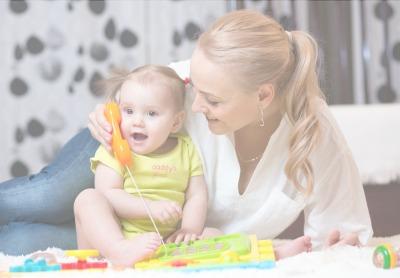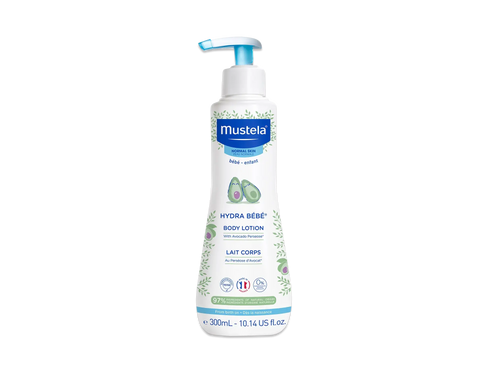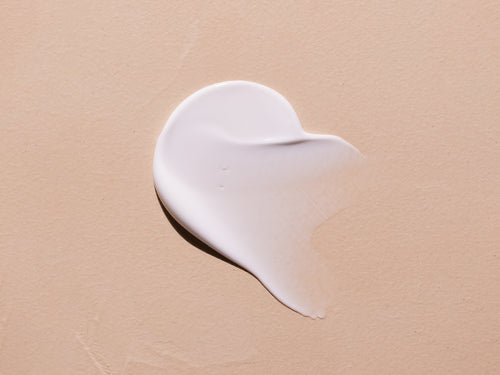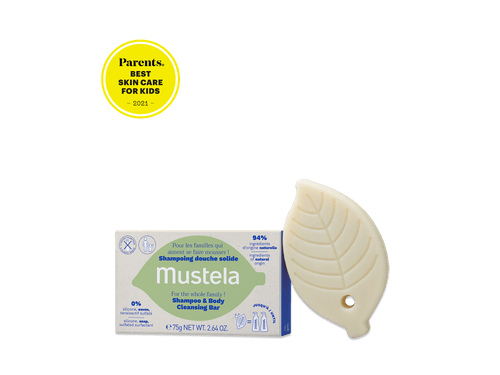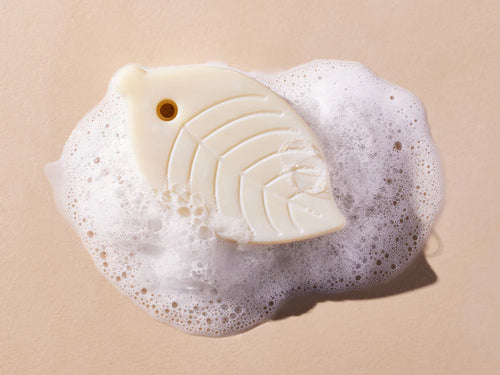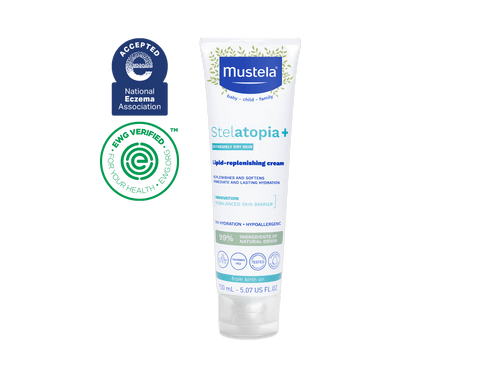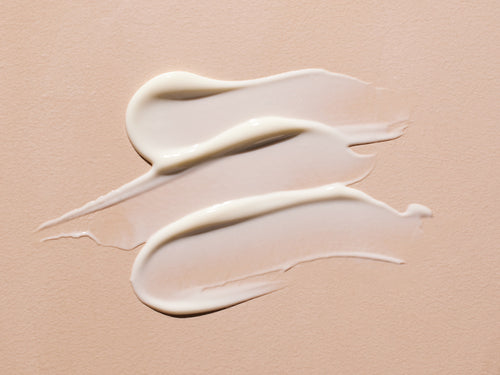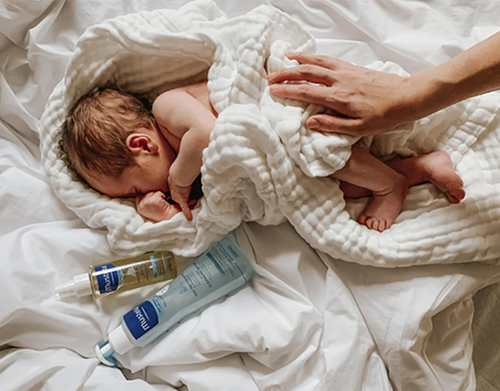With the arrival of your new little one, you dream of hearing them say their first word. Will they say “mama” or “dada” first? Experiencing your baby’s first words will forever leave an imprint on your heart.
While these milestones occur and your baby develops, the experts at Mustela are here to help you by providing an in-depth guide in the area of language development.
Brain Development

Your child’s brain begins developing in the womb, and that development speeds up significantly right before birth and through the second year of life.
In the book “Brain Plasticity,” Dr. Freund states, “At seven months past conception, the baby’s brain weighs about 10 percent of its final adult weight, but by birth it has more than doubled to about 25 percent of final adult weight. By the child’s second birthday, it has tripled to about 75 percent of its final adult weight.”
In order to more fully understand speech development and prepare for your baby’s first words, it’s important to take a bit of a deeper look into the human brain.
Left Hemisphere
According to Brain Made Simple, the left side of the brain is responsible for control of the right side of the body. It’s the more academic and logical side of the brain.
Right Hemisphere
The right hemisphere is responsible for control of the left side of the body. It’s the more artistic and creative side of the brain.
Speech Development
Along with brain development comes speech development. These two go hand-in-hand. Your child’s brain is like a sponge during their early years and is developing at a rapid pace.
At What Age Will Your Baby Start To Talk?
The answer to this question varies depending on your little one’s rate of speech development. Typically around seven to 12 months of age is when you’ll likely hear “mama,” “dada,” or other one-syllable words, such as nominals (labels for objects and people).
Milestones In Speech Development

You’ll likely discover the most language milestones throughout infancy to when your baby becomes a walking, talking toddler.
3 to 6 Months
During these months, you may notice your little one making cooing sounds. At this age, they can also follow sounds with their eyes. By six months, they can recognize your voice!
Other language developments include:
- Squealing
- Gurgling
- Laughing
- Uttering most vowel sounds
- Uttering some consonant sounds (example: p, b, m)
6 to 12 Months
At this age, your little one is attempting to put vowel sounds and consonant sounds together to make words. They can understand words for common items, such as cup, dog, or toy.
Other language developments include:
- Making sounds to get your attention
- Imitating various speech sounds
- Beginning to pay attention when you speak
- Having at least one to two words in their vocabulary bank
- Understanding simple commands
12 to 18 Months
What a fun, inquisitive stage in development this is for your little one! Adding new words to their vocabulary bank is a regular occurrence.
Other language developments include:
- Expressive vocabulary
- 3 to 50 words in vocabulary bank
- Babbling mixing with real words
- Occasional two- and three-word sentences
- Following simple commands
- Understanding simple questions
- Pointing to pictures in books when asked
18 To 24 Months
You are now able to more effectively communicate with your little one at this stage. Your child not only has expressive language (expressing their wants and needs), but also has receptive language (understanding what is being said).
Other language developments include:
- 50 to 300 words in vocabulary bank
- No more babbling
- Two-word sentences or more (combining two words)
- Using one- or two-word questions
Toddler Talk
As your baby enters toddlerhood, their discovery is deepening in the world all around them. You probably can’t get your little one to stop talking! Their brain is continuing to grow and develop while acquiring new words.
Other language developments include:
- Naming familiar and widely-used objects
- Some speech only understood by family members and close friends
- Answering the basic “Who?”, “What?”, “Where?”, and “Why?” questions
- Discussing activities
- Assembling words together to make complete sentences
- Asking questions

Activities To Encourage Your Baby’s First Words
While at home and out and about with your little one, there are plenty of activities you can implement to enhance their language skills.
Reading
This is an activity you can do the day your little one is born. Your baby enjoys hearing your voice through this activity. As your child gets older, sit on the floor and lay them on their tummy while you read. During the toddler stage, you can begin asking comprehension questions.
Singing
No matter how great of a singer you are — or aren’t — your little one will love hearing your voice. Through singing, your baby is exposed to rhythm and pitch.
Singing is a simple activity to do while performing everyday tasks, like putting lotion on your little one. Movement is encouraged through singing, so you’ll be sure to see those little legs kicking when you’re rubbing the lotion in!
Bath Time
During bath time, you can explore with your little one and focus on their senses. Using Mustela’s Multi-Sensory Bubble Bath, you can talk and play at bath time. After your baby’s bath, continue talking and playing during their daily hydration routine to bond, enhance language skills, and encourage speaking.
Repetition
As you expose your baby to objects, it’s important to say the name of the object repeatedly. For example, while you’re holding a ball, say the word “ball” several times. Throughout different stages of development, you’ll notice your little one will try to say the word “ball” and, eventually, they will!
Nursery Decor
Believe it or not, the way you prepare your baby’s nursery has an impact on their language development. Putting print-rich products in the nursery and strategically placing books insight can actually enhance speech development.
Books
We’ve already mentioned reading to your little one, but it’s also important to focus on the pictures. Point to various objects in the book and name them.
You can also try doing a “picture walk” with your little one instead of reading the words. Through the picture walk, you’ll tell the story using the pictures and talk about what you observe in the book.

Flashcards
Flashcards are a great resource to have on-hand at any stage of development. The vibrant colors and pictures on flashcards will improve your child’s memory and trigger a response.
Educational Videos
Educational videos are another resource that can be used to enhance language development in your little one. Encouraging engagement, typically through music, and lengthening their attention span are just a couple of the benefits of educational videos.
Waiting For Your Baby’s First Words: Speech Delay
This is a guide, not a one-size-fits-all solution. Your little one will develop at their own pace. They may begin talking and saying words earlier than the suggested milestones, or they may not.
When To Be Concerned
You know your child. You know what’s best. You know what’s normal and what’s not. The list of milestones in speech development serves as a guide to help you, other caregivers, and your child’s pediatrician to see if your child is on track.
If you’re noticing your little one having some trouble with receptive language (understanding what others are saying), this is a good indicator that they may need to see a pediatrician. Now is a good time to start a running record of what you observe in your child on a daily basis.
Additionally, if you’re noticing your little one having difficulty with expressive language (sharing their thoughts), this is another indicator that you might need to begin keeping a record for your pediatrician.
Other signs of a language development problem to watch for are:
- Difficulty putting syllables together
- Stuttering
- Hesitating before speaking
- Delayed speech or not talking at all

What To Do Next
If you notice any of the characteristics listed above, reach out to your child’s pediatrician. There are routine questions the doctor can ask during well-child checkups or special appointments. If concerned, the pediatrician may refer you to a speech-language pathologist.
All stages of development are such a fun and exciting time in your little one’s life! These “firsts” are memories you’ll never forget. Here at Mustela, we’re right there with you to soak up the precious moments.


